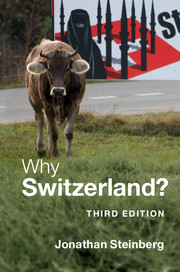4 - Language
Published online by Cambridge University Press: 05 November 2015
Summary
English-speakers rarely think about their language. Unlike the French who poured millions into propagating the French language overseas, the British in their empire (and the Americans in theirs) never worried much about the language as such. There is no recognised academy in any part of the English-speaking world to defend the purity of the language. As a world language, English is casual, slovenly and varied. In Switzerland, and in most European countries, language is a very different thing. By excluding those who cannot understand, it sets the outer limits of membership in a certain type of community. The precise meaning of that membership will depend on the status of the language: written or unwritten, used in a wide geographical area or restricted, spoken by all social classes or only by some. It will also depend on the economic, social, legal, political, religious and ideological structures in which it is used, for example, the language acceptable in a court of law. Language can change social and political institutions. It can help to alter the productive forces of an economy and can enlarge or contract markets. A startling example of life imitating speech is Italian unification. In his fascinating study of language in the history of Italy, Tullio De Mauro estimates that in 1861, the heroic epoch of Italian unification, only 2.5% of the total Italian population could speak Italian. The other twenty-five million inhabited what he calls a ‘dark wood of dialect’ so dense that when the Visconti-Venesta brothers walked down the streets of Naples speaking Italian they were thought to be Englishmen. Modern Italy first took form in language, and this may be said of modern Slovakia, Slovenia, Romania, Serbia and, for different reasons, modern Israel. Perry Anderson is right when he observes that ‘spoken language, far from always following material changes, may sometimes anticipate them’.
Language is not a colourless fluid through which reality is refracted but a thick, viscous substance like tar. It has its own ebbs and flows which never leave the surrounding environment utterly unchanged. Political frontiers, accidentally imposed, may dam its currents. The accumulating liquid at first stagnates; then, separated off from its original mainstream, it literally becomes another language. Slovak differs from Czech, because the border of the medieval Kingdom of Hungary divided hitherto undivided west Slavic-speakers.
- Type
- Chapter
- Information
- Why Switzerland? , pp. 140 - 170Publisher: Cambridge University PressPrint publication year: 2015



